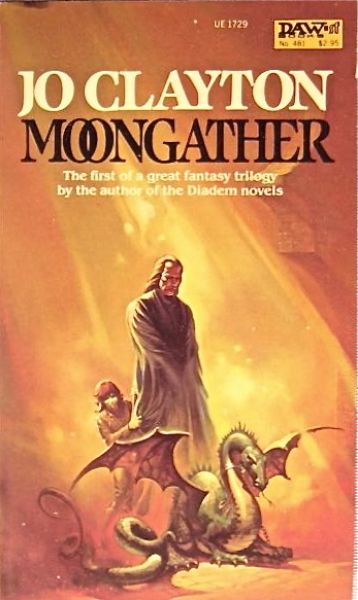Nor are jerks
Moongather (Duel of Sorcery, volume 1)
By Jo Clayton

14 Apr, 2015
0 comments
My terrible confession: until now, despite buying Jo Clayton’s novels with the intention of reading them at some point, despite being aware enough of her work to have picked up significant details of the Diadem series through cultural osmosis, I have a horrible feeling that this is the first Clayton I have actually read.
Jo Clayton (1939 – 1998) was, I believe, another one of Donald Wollheim’s discoveries. Her debut novel, 1977’s Diadem from the Stars, was the 235th book DAW published [1]. The Diadem universe books made up a large fraction of her output and are probably her best known works. That said, the Diadem books were not the whole of her thirty-five book bibliography. The book I have in hand, 1982’s Moongather, first in the Duel of Sorcery trilogy, is completely unrelated to the Diadem series. It is a fantasy rather than science fiction.
It begins with a shocking betrayal
as Serroi, a seasoned meie warrior, abandons her shield-mate Tayyan to a magic-wielding Norid and flees across rooftops from a foe she fears deep in her bones.
What Tayyan and Serroi had learned, much to their own alarm, is that Lybor, an ambitious doamna, or queen), has hired a Norid (a lesser Nor, or wizard) to place a demon in the body of Domnor Hern on the day of Moongather, when demons are most able to enter this world. Lybor believes that this substitution will allow her to turn Hern into her obedient puppet, Serroi could tell Lybor from extensive personal experience that whatever the Norid had in mind when he agreed to assist Lybor, it wasn’t in the best interests of anyone but the Norid.
Haunted by guilt over abandoning Tayyan, Serroi spends the rest of the book trying to uncover the information the Norid was so determined to conceal and take it to someone with the power to intervene. This takes her on a long and dangerous journey, in the course of which she picks up a youthful sidekick named Dinafar. Unfortunately for Serroi, her betrayal of Tayyan and Lybor’s betrayal of Hern are not even close to being the greatest betrayals of trust in this book; Serroi’s faith in those around her proves terribly misplaced.
~oOo~
For some reason, the little I knew about Clayton led me to expect an adventure along the lines of a Norton, with a linear plot and workmanlike prose. There are some similarities, but Clayton seems to have been a more ambitious writer than Norton. For one thing, Clayton has broken Serroi’s life into two narratives, one the adventure described above, and one the story of Serroi’s childhood, which explains why it is she fears the Nor so much that she would break her oath to Tayyan.
Serroi is marked from birth as something unusual, a green-skinned mistborn of the windrunners. Unlike a lot of Chosen Ones in fantasy, Serroi seeks out a role for herself that is orthogonal to her magical gift. Her ability to communicate with the natural world makes her useful, particularly to a specific Nor who cannot directly affect the living world but can through her. What her gift doesn’t do is make her particularly powerful, just valuable. Any agency she wants, she has to earn the hard way.
I note with some disappointment that the various Nor (Noris, Norids, Norits, all denoting a level of power) are a consistently nasty lot (thus predictable). Perhaps I should also note, in their defense, that their magic either requires or causes cognitive deficits that make most human emotions a complete mystery to them. The most prominent Nor in the book causes Serroi considerable pain by using her to try to install demons in animal bodies. This is a painful process that invariably kills the animals. He is baffled by Serroi’s horror at her role. He simply cannot understand why killing the animals she loves in the name of research would upset her.
I am not sure what to make of the fact that only men can become Nor. I’ve not read the next two books in this trilogy, so I cannot say if the author ever explains why that would be true or if it’s just a random worldbuilding choice. Since traditionally primarily male occupations like soldier are explicitly open to women in this world, it is possible that Clayton has a point to make by depicting the Nor as an exception to a more generally gender-neutral culture.
(Sidenote: the whole business with the Nor reminds me of how magic works in Harry Connolly’s recent trilogy.)
This is the first book in a trilogy and ends with something of a cliffhanger. However, Clayton is kind enough to the reader to give this book some closure. It works as a standalone novel as well as part one of three. Modern fantasy authors might well consider that a good example to follow.
I would love to have done this as a rediscovery but while there are plans to reissue Clayton’s works I do not believe that this plan has come to fruition at his time. Readers interested in Clayton will have to go the used book route, I think.
More information about Clayton and her works can be found at her site.
1: DAW is currently past the 1600-books-published mark.
